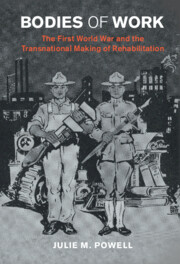Book contents
- Bodies of Work
- Studies in the Social and Cultural History of Modern Warfare
- Bodies of Work
- Copyright page
- Dedication
- Contents
- Figures
- Tables
- Acknowledgements
- Introduction: Whole Nations in Arms
- 1 The Gospel of Rehabilitation
- 2 A Great Army of Industrial Soldiers
- 3 A Duty Incumbent on All Allied People
- 4 He Marches Off On an Entente Leg
- 5 A Charge Almost If Not Quite as Sacred
- Conclusion: The Right to Rehabilitation
- Bibliography
- Index
Conclusion: The Right to Rehabilitation
Published online by Cambridge University Press: 20 October 2022
- Bodies of Work
- Studies in the Social and Cultural History of Modern Warfare
- Bodies of Work
- Copyright page
- Dedication
- Contents
- Figures
- Tables
- Acknowledgements
- Introduction: Whole Nations in Arms
- 1 The Gospel of Rehabilitation
- 2 A Great Army of Industrial Soldiers
- 3 A Duty Incumbent on All Allied People
- 4 He Marches Off On an Entente Leg
- 5 A Charge Almost If Not Quite as Sacred
- Conclusion: The Right to Rehabilitation
- Bibliography
- Index
Summary
Bodies of Work examines the transnational development of large-scale national systems, international organisations, technologies, and cultural materials aimed at rehabilitating Allied ex-servicemen, disabled in the First World War. It considers the ways in which rehabilitation was shaped by both durable and discrete influences, including social reformism, paternalist philanthropy, the movement for workers’ rights, patriotism, class tensions, cultural ideas about manliness and disability, nationalism, and internationalism. In recognising rehabilitation systems as complex and multi-faceted sociocultural constructions, it sheds light on the ways in which they became sites for the contestation and maintenance of boundaries of belonging. Internal to such systems, the book argues, were the limits of expansion of services to the industrially disabled. In interrogating the post-war quest to extend rehabilitation rights to civilians, the book provides insight into the development of social rights and statist welfarism and the evolution of ideas about the means, ends, and objects of humanitarianism.
- Type
- Chapter
- Information
- Bodies of WorkThe First World War and the Transnational Making of Rehabilitation, pp. 221 - 229Publisher: Cambridge University PressPrint publication year: 2022



